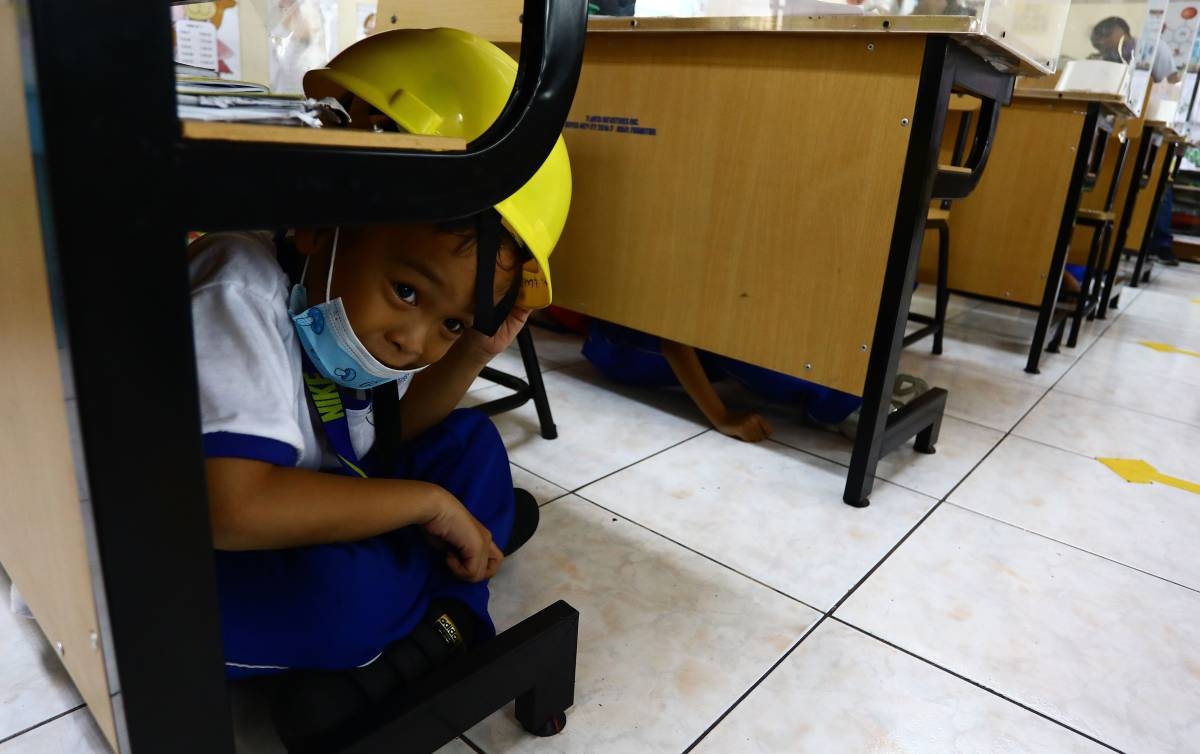Read this in The Manila Times digital edition.
(UPDATE) THE chief of the Philippine Institute of Volcanology and Seismology (Phivolcs) on Tuesday said the country is now more prepared in case the “Big One” occurs owing to the people’s awareness gained from the government’s regular earthquake drills, among others.
“We are more prepared now than say 20 or so years ago,” Phivolcs Director Teresito “Toto” Bacolcol declared.
Bacolcol issued the statement in reaction to the deadly magnitude 6.8 earthquake that struck Morocco on September 8, where over nearly 3, 000 people have died.
Students wearing yellow hardhats, duck under tables inside the Aurora Quezon Elementary School in Manila, during the second quarter online National Simultaneous Earthquake Drill (NSED) PHOTO: MIKE ALQUINTO
“We can say we are now more prepared because we are already aware, especially with the earthquake drills that the National Disaster Risk Reduction and Management Council is conducting every quarter,” the Phivolcs chief said.
In an interview with The Manila Times, he said his agency has been constantly communicating with concerned government agencies as well as local government units (LGUs), especially in reminding them on implementing measures to minimize impacts of earthquakes in their turfs.
delivered to your inbox
“They must make sure that the big buildings or structures that are being constructed are meeting the requirements under the Building Code, that they can withstand a strong earthquake,” Bacolcol added.
He said people must always be ready by keeping an emergency bag that contains medicines, among others, and food that can last at least up to three days.
Bacolcol cited some LGUs like Quezon City, Makati City, Pasig City and Muntinlupa City that have been implementing measures to encourage those residents living above the West Valley Fault (WVF) to transfer to other places.
“We can cite for example the LGU of Quezon City that has ongoing projects as they constantly remind homeowners and residents affected by the West Valley Fault to move out and transfer away from the fault line,” he said.
In its previous study, Phivolcs said Quezon City and Manila would have the highest number of casualties if a magnitude 7.2 quake emanates from the WVF.
It also said close to 6,000 people could die in Quezon City alone while more than 24,000 could be seriously injured.
The villages of Batasan Hills, Commonwealth, Bagong Silangan, Holy Spirit and Matandang Balara would be the most affected areas in case a major tremor occurs, Phivolcs said.
Ready to help
President Ferdinand Marcos Jr. also on Tuesday said the Philippines is ready to help Morocco in its hour of need.
In a statement, Marcos also said the Philippines stands in grief and solidarity with the Moroccan people, “and our prayers go to the families affected by this tragedy.”
“The Filipino people are deeply saddened to learn of the devastating 6.8-magnitude earthquake that has tragically claimed over 2,000 lives in Morocco,” the President added.
“The Philippines is ready to offer assistance and any support that may be needed for the swift recovery of your nation. We have faith in the strength and resilience of the Moroccan people to unite and rebuild in the face of such adversity,” he said.
The Philippine Embassy in Morocco, citing data as of September 11 from the Moroccan Interior Ministry, said 2,497 people died from the earthquake while 2,476 were injured.
“As of the moment, the embassy has received no reports of any Filipino being affected by the earthquake. It is in touch with leaders and coordinators in various areas of Morocco,” it said in a statement.
The embassy encouraged Filipinos in affected areas to contact the mission through its hotline +212694202178 and official Facebook page in case they need assistance.
Morocco’s King Mohammed 6th thanked Spain, Qatar, the United Kingdom and the United Arab Emirates for sending aid over the weekend.
Seismological experts have warned survivors against aftershocks that could last weeks or even months after the earthquake.
Major telecommunications companies had announced their emergency assistance to their customers affected by the Morocco earthquake. Smart Communications Inc. (Smart) said its customers in the north African country will receive emergency communication assistance to help.
“We are monitoring the situation in Morocco and are ready to assist our kababayan (countrymen). It is important for us to provide them with means to communicate in this time of crisis as we also pray for their health and safety overseas,” Shing Dimagiba, Smart vice president for Postpaid and International Roaming Business, said, adding postpaid customers will have their postpaid bills reversed for roaming calls and text messages, while prepaid customers will also have free load assistance so that they can contact their families or the authorities to report their situation.
Smart roaming customers in Morocco simply need to turn on their phones and connect to Smart’s network partners to use these free services from Smart.
They will receive a text message with instructions that they can easily follow.
On the other hand, Globe said it is extending roaming credits, free prepaid load to customers in quake-hit Morocco.
It also said it is extending assistance in the form of postpaid roaming credits and free prepaid load to customers in Morocco.
This will allow Globe customers to use its roaming services to make or receive calls, and send text messages to all networks while in Morocco.
To avail of these free roaming services, customers only need to connect to Globe’s roaming partners Orange and Inwi.
“We wish to provide our customers in Morocco immediate connectivity assistance so they could reach out and communicate with their loved ones during this difficult time,” Coco Domingo, Globe VP for Postpaid and International Business, said.


















